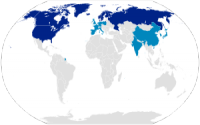Arctic Strategy
Quicktabs: Keywords

Competition is heating up as Arctic opens, with Russia pursuing an aggressive approach with its icebreaker fleets and territorial claims. The author argues that the U.S. needs to rethink its Arctic policy to be able to effectively challenge Russia, including by ratifying the Law of the Sea convention.
[ More ]
Secretary of State Mike Pompeo on Monday sharply warned China and Russia against “aggressive” actions in the Arctic, while resisting a diplomatic push by other countries in the region to avert the worst effects of climate change.
[ More ]
Rich with energy resources, minerals and strategic positioning, the warming Arctic is ripe for territorial disputes, USCG Adm. Zukunft warns in a recent speech.
[ More ]
The Coast Guard commandant warned that his service’s presence in the Arctic may not be enough to ward off Chinese and Russian encroachment unless the U.S. signs the United Nations Convention on the Law of the Sea – and that even if the U.S. signed the treaty now, it might be too little, too late.
[ More ]
As Secretary of State Rex W. Tillerson heads to Alaska on Wednesday for talks on Arctic issues, he finds himself in climate policy limbo, preparing for a meeting at which global warming will be front and center yet representing an administration that is still on the fence about fighting it.
[ More ]
The commandant of the U.S. Coast Guard issued a stark warning on Wednesday that Russia was leagues ahead of Washington in the Arctic. And while the warming Arctic opens up, the United States could be caught flat-footed while other geopolitical rivals swiftly step in.
[ More ]
Russia is increasing its presence, both militarily and commercially, in the Arctic, taking advantage of the absence of U.S. leadership or presence in the region.
[ More ]
U.S. national security leadership has put Arctic issues on the back burner for decades, focusing on global hot spots in the Middle East, Asia and Russia. But the ice pack on the roof of the world is melting, and a surge of economic and foreign military activity is forcing Washington to take a hard look at how to fund polar priorities under an already strained federal budget.
[ More ]
The authors report on the findings of a recent conference study report on how the U.S. should manage its upcoming leadership role on the Arctic Council to best ensure a continuation of international cooperation in the Arctic.
[ More ]
At least 23 different federal agencies are responsible for implementing the Obama administration's policies in the Arctic Ocean, from the Office of Science and Technology Policy to the State Department to NASA. So President Obama signed an executive order Wednesday to better coordinate all those efforts, creating an Arctic Executive Steering Committee to eliminate overlapping areas of responsibility.
[ More ]Pages
There are currently 160 parties to UNCLOS, including four of the five Arctic coastal states: Canada, Denmark, Norway, and Russia (which joined in 1997).31 As of 2009, the United States had not yet acceded to the Convention, despite extensive and bipartisan support for it to do so.32 And while the United States bestows the status of customary international law on most UNCLOS provisions,33 the failure of the United States to accede to the treaty has deprived it of a “seat at the table when the rights that are vital to [U.S.] interests are debated and interpreted.”34 Non-party status precludes the United States from submitting an application for the recognition of any extended continental shelf it may be able to claim in the Arctic. Indeed, to the extent the United States is concerned about the adherence of Russia or any other country to the laws and norms that apply to the Arctic, the United States would considerably strengthen its position by swiftly acceding to the Convention.
The United States should accede to UNCLOS and file an internationally accepted claim for jurisdic- tion over the continental shelf extending beyond the 200-nautical mile Exclusive Economic Zone. In taking this step, the United States would legitimize its claim to nearly 300,000 square miles of sovereign underwater territory for scientific exploration, marine stewardship and natural resource exploration and extraction.38 Most importantly, acceding to UNCLOS would protect the nation’s sovereignty, ensure freedom of navigation in the Arctic for U.S. commercial and military vessels and prevent competing maritime claims against U.S. sovereignty.
UNCLOS must be the legal bedrock of U.S. Arctic policy. UNCLOS is the framework of cooperation within the region. Other nations have rejected the push for an Arctic treaty, like the Antarctic Treaty, favoring instead the UNCLOS structure.245 By ratifying UNCLOS, the U.S. will advance a “remarkable treaty that expands U.S. sovereign rights, powerfully serves U.S. needs for the Navy and the Coast Guard, and provides American industry with the security necessary to generate jobs and growth.”246 By joining the UNCLOS alliance, the U.S. will be better able to settle maritime claims and disputes between other Arctic nations on issues such as outer continental shelf and maritime boundary line issues. The U.S. will also be in a better position to challenge the jurisdictional claims of both Russia (Northern Sea Route) and Canada (Northwest Passage). Only through UNCLOS can the U.S. make rightful claim to the Extended Continental Shelf and the natural resources within it. Implementation requires Congressional action and pressure by the Administration to get UNCLOS to a vote in the Senate.
Accede to the Law of the Sea Convention
Objective: Continue to seek the Senate’s advice and consent to accede to the Law of the Sea Convention.
Next Steps: The Administration is committed, like the last three Administrations, to pursuing accession to the Convention on the Law of the Sea and will continue to place a priority on attaining Senate advice and consent to accession.
Measuring Progress: Progress will be measured by gaining Senate approval for the Law of the Sea Convention.
Lead Agency: Department of State
Supporting Agencies: Department of Commerce (National Oceanic and Atmospheric Administration), Department of Defense, Department of Homeland Security, Department of the Interior, Department of Transportation
Delineate the Outer Limit of the U.S. Extended Continental Shelf
Objective: Develop the U.S. submission in support of delineating the outer limit of the U.S. Extended Continental Shelf in the Arctic.
Next Steps: Continue to conduct activities in support of the United States’ Extended Continental Shelf (ECS) in the Arctic, including:
- Process and interpret the seismic data, refine the base of slope, and develop a geologic framework for the U.S. ECS in the Arctic Ocean and Bering Sea through 2015.
- Complete the analyses and documentation necessary to delineate the outer limits of the U.S. ECS in the Arctic Ocean and Bering Sea through 2016.
Measuring Progress: Progress toward delineation of the outer limit of the U.S. continental shelf in the Arctic will be measured by the completion of the U.S. Extended Continental Shelf Task Force analysis, preparation of the necessary documentation, and submission of a well-supported delineation of the U.S. Extended Continental Shelf in the Arctic and elsewhere in accordance with the Convention on the Law of the Sea.
Lead Agency: Department of State
Supporting Agencies: Department of Commerce (National Oceanic and Atmospheric Administration), Department of Defense, Department of Homeland Security, Department of the Interior (United States Geological Survey)
Another strategy that could boost U.S. influence in the Arctic, buffer looming conflicts, and help clarify seabed claims would be for the Senate to ratify the United Nations Convention on the Law of the Sea.
The Law of the Sea took effect in 1994 and established rules for how the oceans and ocean resources are used and shared. That includes determining how countries can claim parts of the seabed. The U.S. initially objected over a section that limited deep seabed mining, but that section was amended to alleviate some of those concerns. Presidents Bill Clinton, George W. Bush and Barack Obama all urged the Senate to ratify it, but that still has not happened.
Ratification would give the U.S. a stronger international legal position in contested waters. It also would enable the U.S. to claim more than 386,000 square miles – an area twice the size of California – of Arctic seabed along its extended continental shelf and fend off any other country’s overlapping claims to that area.
Without ratification, the U.S. will be forced to rely on customary international law to pursue any maritime claims, which weakens its international legal position in contested waters, including the Arctic and the South China Sea.
